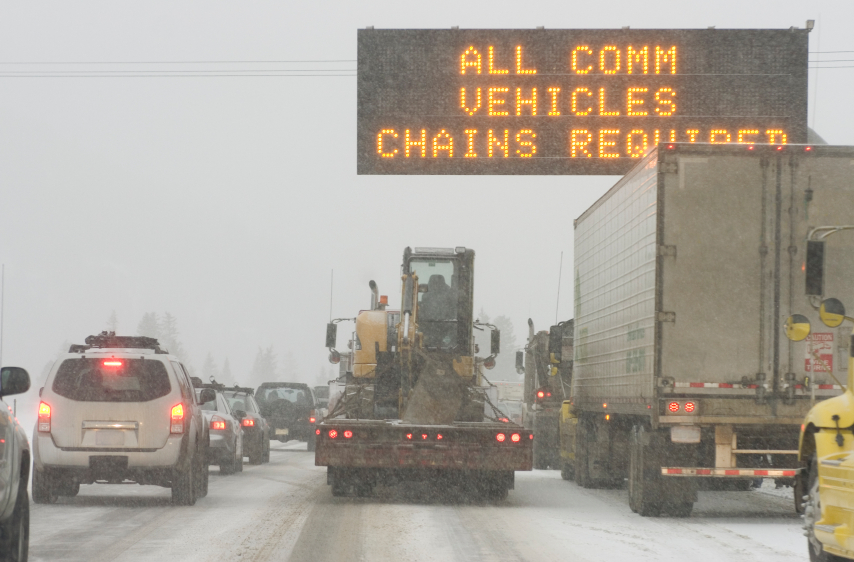Colorado's Chain Law
Seasonal Closures
From Sept. 1 through May 31, all commercial vehicles traveling on I-70 between the Dotsero exit (mile point (MP) 133) and the Morrison exit (MP 259) must carry sufficient chains to be in compliance with the Colorado chain law.
Chain Law Topics
Chains help commercial vehicles traverse the steep climbs often present in the high country. Without chains, vehicles often become disabled, causing traffic delays and sometimes road closures. For the safety of the traveling public, it's critical to use chains to be in compliance with Colorado's chain law.
Colorado's chain law applies to all state, federal and interstate highways, and was initially enacted in 1996. Colorado's chain law defines commercial vehicles as being used in commerce to transport passengers or property and fitting into one of the following categories:
gross combination weight rating of 16,001 or more pounds, inclusive of a towed unit, which has a gross vehicle weight-ration of more than 10,000 pounds
gross vehicle weight rating of 16,001 or more pounds
designed to transport 16 or more passengers, including the driver
A chain law restriction for vehicles weighing less than 16,001 pounds—including passenger vehicles, crossovers, SUVs and small trucks—can be put into effect in Colorado at any time when weather conditions are severe, primarily on roadways with significant ascending and descending grades.
Stay in Compliance!

Sign up for sign up for email and text message alerts to stay informed about road conditions, road closures and chain laws.
Know Before You Go
CDOT urges travelers to be aware of chain and traction law codes before heading out on the roadway, specifically:
-
Commercial Vehicle Chain Law: Commercial vehicles and trucks must have chains. Vehicles without chains can often lose traction, causing traffic delays and sometimes road closures. For the safety of the traveling public, it's critical to use chains to be in compliance with Colorado's chain law.
-
Passenger Vehicle Traction Law: All motorists are required to either have an all-wheel or four-wheel drive vehicle, or (for two-wheel drive vehicles) snow tires or all-weather tires with a mud/snow designation. Tread depth on all tires must be at least 3/16" regardless of vehicle type. Vehicles that do not meet these criteria must carry chain devices or alternative traction devices. The law focuses on passenger vehicles, as commercial vehicles have their own restrictions. It is unlawful to proceed when a state highway is closed or to proceed when a restriction is in effect without the required traction equipment. Violators will be given a citation, which comes with a $100 fine and $32 surcharge. That jumps to a $500 fine with a $156 surcharge if a violation results in the closure of one or more traffic lanes.
-
Passenger Vehicle Chain Law: All passenger vehicles weighing less than 16,001 pounds gross vehicle weight rating (GVWR) must have tire chains or alternate traction devices (ATD) installed on two or more drive tires. It is unlawful to proceed when a state highway is closed or to proceed when a restriction is in effect without the required chain/ATD equipment installed. Violators will be given a citation, which comes with a $100 fine and $32 surcharge. That jumps to a $500 fine with a $156 surcharge if a violation results in the closure of one or more traffic lanes.
